Diplomatic Bluebook 2017
Chapter 2
Japan's Foreign Policy that Takes a Panoramic Perspective of the World Map
2.Situation of Sub-Saharan Africa and Japan's efforts
(1) African Union (AU)
The 26th African Union (AU) Assembly Summit was held in Addis Ababa (Ethiopia) in January, and Chad was elected as Assembly Chairperson of the AU for 2016. The State Minister for Foreign Affairs Kihara attended the 28th AU Summit Ministerial Executive Council Ordinary Session ahead of the Assembly Summit, while Special Advisor to the Prime Minister Kawai attended the Assembly Summit as the representative of Japan, and met with many African dignitaries, confirming matters including cooperation towards the TICAD VI.
An election of the Chairperson of the AU Commission took place at the 27th AU Assembly Summit held in Kigali (Rwanda) in July, but none of the candidates obtained the necessary votes. The election was conducted again at the 28th Assembly Summit in January 2017, and Chadian Minister of Foreign Affairs and African Integration Moussa Faki Mahamat was elected.
In March 2017, a decision was made to establish the Japanese Permanent Mission of Japan to AU, targeting 2018.
Africa, which continues to grow against a backdrop of abundant resources and an increasing population, is increasing its presence in the international community, and is an important partner for Japan politically and economically. Since the launching of the Tokyo International Conference on African Development (TICAD) in 1993, Japan has consistently led discussions in the international community regarding the development issues of Africa. TICAD is one of the largest international conferences on African development and it is co-organized by the UN, the United Nations Development Programme (UNDP), the World Bank and the African Union Commission (AUC) as an “open and inclusive forum.” It is attended by a wide range of people from international organizations involved in development, development partner countries including Europe, America and Asia, civil society and private sectors.
The Sixth Tokyo International Conference on African Development (TICAD Ⅵ), which was held in Nairobi, Kenya, over two days from August 27 to August 28, 2016, was a historical meeting, not only because it was the first to be held in Africa but also from the viewpoint of its scale and outcomes. The representatives of 53 African countries, international organizations and civil society, and private companies, and others participated in TICAD Ⅵ, and including the side events there were approximately 11,000 participants, the greatest number in the history of TICAD. At the meeting, intensive discussions were held regarding responses to the development issues that Africa has been facing since TICAD Ⅴ in 2013, including the emerging need to change economic structures due to the declining international resources prices, and the fragility of health systems seen in the Ebola virus outbreaks, and destabilization of societies and the Nairobi Declaration was adopted as the outcome document.
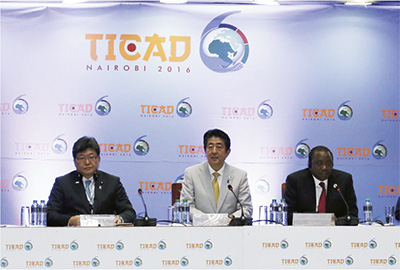 Prime Minister Abe attending the Japan-Africa Business Conference (August 28, Nairobi, Kenya; Photo: Cabinet Public Relations Office)
Prime Minister Abe attending the Japan-Africa Business Conference (August 28, Nairobi, Kenya; Photo: Cabinet Public Relations Office)Furthermore, the major feature of TICAD Ⅵ was the full-fledged involvement of the private sector. From Japan, a business mission of Sadayuki Sakakibara, Chairman of the Japan Business Federation, and other leaders from 77 organizations including Japanese businesses and universities accompanied Prime Minister Abe, and representatives of the private sector participated in all of the sessions. At the Japan-Africa Business Conference, a side event, 73 MOUs were signed between these private sector organizations and the African governments, companies, and so on. The Chairman of the Japan Business Federation (Keidanren) and the top company executives representing Japan had never visited Africa on this scale before. From the African side as well, top executives of private sector companies representing the continent attended, expressed their appreciation of the contributions of Japanese companies, and stated their expectations for further encouragement of investment.
Moreover, Prime Minister Abe announced the launch of the Japan and Africa Public-Private Economic Forum in order to ensure that the momentum toward promoting trade and investment with Africa created by TICAD Ⅵ is not transient. This is a forum in which government ministers from both Japan and Africa and leaders of economic organizations and companies gather together in Africa once every three years, and the public and private sectors work together to identify, from a business perspective, the challenges to overcome to further promote investment. Furthermore, keeping in mind the policy target that Japan “aims to achieve signing and effectuation of investment agreements in 100 countries and regions by 2020,” Japan is working intensively on investment agreements with African countries as well.
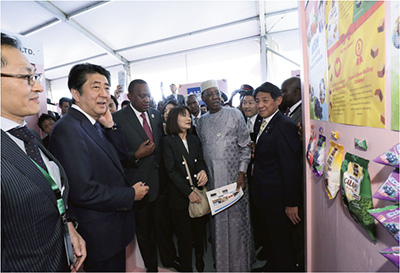 Prime Minister Abe visiting the Japan-Africa EXPO (August 27, Nairobi, Kenya; Photo: Cabinet Public Relations Office)
Prime Minister Abe visiting the Japan-Africa EXPO (August 27, Nairobi, Kenya; Photo: Cabinet Public Relations Office)The strength of TICAD is the steady follow-up on initiatives taking into account the diverse needs of the African countries. In October 2016 Deputy Chief Cabinet Secretary Hagiuda held exchanges of views with the African ambassadors in Tokyo regarding steady implementation of the outcomes of TICAD Ⅵ. Both the public and private sectors will actively advance initiatives with a view to TICAD Ⅶ in 2019.
(2) East Africa
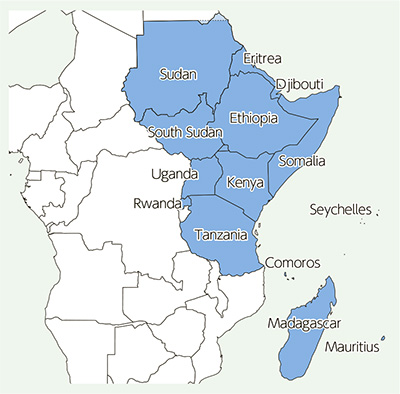
A Uganda
Uganda is one of the major countries in East Africa which has high potential in trade and investment, in addition to stable domestic politics, including possible oil field development in the future. President Museveni was re-elected in February 2016, which will be his fifth term in office. Member of the House of Representatives and Vice President of the Japan-AU Parliamentary Friendship League Kazunori Tanaka attended the inauguration ceremony of the president in May as the special envoy of the Prime Minister. In addition, a Japan-Uganda summit meeting was held on the occasion of TICAD VI in August 2016 where both countries agreed to strengthen the cooperative relations in areas such as economy.
B Ethiopia
In Ethiopia, sporadic demonstrations against the government across the country occurred around July, which led to Prime Minister Hailemariam declaring a state of emergency in October, and a new Cabinet was formed in November. On the other hand, the strong economic growth continues, and the transformation of the economic structure towards industrialization has been advancing.
In relationship with Japan, Special Advisor to the Prime Minister Kawai visited Ethiopia on the occasion of the 26th AU Summit and had a meeting with Prime Minister Hailemariam. In July, the Japan External Trade Organization (JETRO) re-opened its office in Addis Ababa, which is set to further encourage the activities of Japanese companies. Furthermore, Foreign Minister Kishida met with Ethiopian Foreign Minister Tedros on the occasion of the UN General Assembly in September, and they discussed the strength of economic relations, as well as collaboration in the field of human resource development through “Kaizen.”
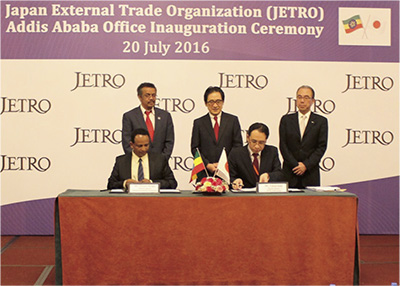 Opening Ceremony of JETRO Addis Ababa office (July 20, Addis Ababa, Ethiopia)
Opening Ceremony of JETRO Addis Ababa office (July 20, Addis Ababa, Ethiopia)C Kenya
Kenya, which is the gateway to East Africa and the driving force of the economy in the region, continues to have solid growth underpinned by the stable government under President Kenyatta. However, countermeasures against the threat of terrorism by the al-Qaida-based Islamic extremist organization Al-Shabaab located in Somalia and other general crimes are the challenges.
As for the relationship with Japan, Foreign Minister Kishida held a breakfast meeting with Ambassador Amina, Cabinet Secretary for Foreign Affairs, and other VIPs on the occasion of the open debate of the UN Security Council in July. In addition, Prime Minister Abe paid a state visit to Kenya on the occasion of the TICAD VI in August, held a summit meeting with President Kenyatta and issued a joint statement between Japan and Kenya. Both leaders took this opportunity to advance bilateral relations including the signing of the Japan-Kenya Investment Agreement and a Memorandum of Understanding in relation to the Mombasa Special Economic Zone. The Japan-Kenya foreign ministers' meeting was also held on the occasion of the TICAD VI. In addition, there have been visits by dignitaries of both countries. In November, Speaker of the National Assembly of Kenya Muturi visited Japan by the invitation of the Speaker of House of Representatives of Japan Tadamori Oshima, and paid a courtesy call on Prime Minister Abe.
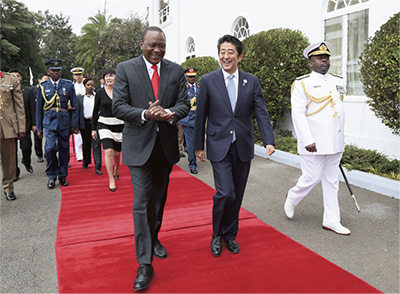
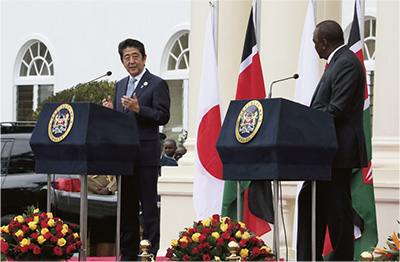 Prime Minister Abe's State Visit to Kenya (Top: Welcoming event; Bottom: Joint press conference) (August 26, Nairobi, Kenya, Photo: Cabinet Public Relations Office)
Prime Minister Abe's State Visit to Kenya (Top: Welcoming event; Bottom: Joint press conference) (August 26, Nairobi, Kenya, Photo: Cabinet Public Relations Office)D Djibouti
Djibouti is situated at a strategic point which connects important sea lanes from Europe to the Indian Ocean and Asia through the Mediterranean Sea, the Suez Canal and the Red Sea. The incumbent President Guelleh was re-elected for a fourth term at the election held in April.
Japan has been implementing anti-piracy activities in Somalia and the Gulf of Aden since 2009. In 2011, the Japan Self-Defense Forces started operation of their installations. The activities of various countries' units including the Self-Defense Force have contributed significantly to reducing the number of piracy incidents in the sea area. Bilateral relations have been strengthened with Member of the House of Representatives (and President of the Parliamentary group for friendship between Japan-Djibouti) Itsunori Onodera attending President Guelleh's inauguration ceremony as special envoy of the Prime Minister in May 2016 and the Japan-Djibouti summit meeting was held on the occasion of the TICAD VI in August.
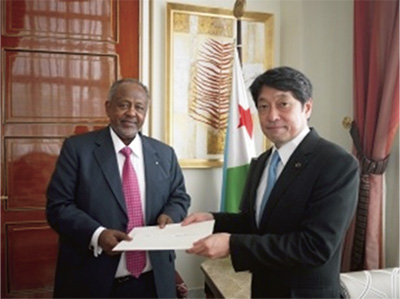 Special Envoy of the Prime Minister, Mr. Onodera handing a letter from Prime Minister Abe to Djibouti President Guelleh (May 8, Djibouti)
Special Envoy of the Prime Minister, Mr. Onodera handing a letter from Prime Minister Abe to Djibouti President Guelleh (May 8, Djibouti)E Seychelles
The Seychelles, an island country consisting of 115 islands, is located in the middle of the Indo-Pacific, which is a strategic point connecting Africa with Asia. The constitutional amendment in April reduced the maximum number of presidential terms from three to two. Consequently, in October, the incumbent President Michel, who had already been elected for a third time, stepped down, and Vice President Faure was promoted to the President.
F Somalia
Progress is being made towards the reconstruction of the nation following the civil war in Somalia and the international community has provided assistance for facilitating the political process on the occasion of the Federal Parliament elections. The Presidential election was peacefully held in February 20. Against such threats, countermeasures have been taken towards the stabilization of the situation through the Somali National Army and the African Union Mission In Somalia (AMISOM).
G Madagascar
The democratic process in Madagascar has taken time following the political change in 2009, but the political situation has been relatively stable since President Rajaonarimampianina appointed Prime Minister Mahafaly and formed a new Cabinet in April 2016.
The Japan-Madagascar summit meeting was held on the occasion of the TICAD VI in August 2016, and both leaders confirmed the strengthening of bilateral relations, including assistance for investment by Japanese companies.
H South Sudan
In South Sudan, in April, former Vice President Machar of SPLM-IO (Sudan People's Liberation Movement in Opportunities) was appointed as the First Vice President, and the Transitional Government of National Unity was established in accordance with the “Resolution of the Conflict in the Republic of South Sudan”, signed in the previous year. However, fighting broke out in the capital Juba in July and First Vice President Machar fled the country. President Salva Kiir, in cooperation with First Vice President Taban Deng Gai, representing SPLM-IO, took measures to implement the agreement and prepare for a national dialogue.
Japan has contributed to establishing peace and stability and nation building by the South Sudanese government through measures such as the dispatch of the Self Defense Force to the UN Mission in the Republic of South Sudan (UNMISS). A decision was made in March 2017 to end the activities of the Self Defense Force engineering units at the end of May (See 3-1-3 (2)).
(3) Southern Africa
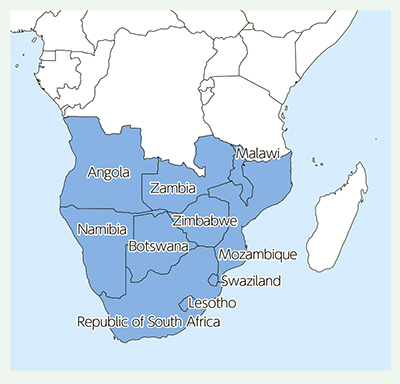
A Angola
Angola has been achieving high economic growth due to its abundant energy and mineral resources. However, the decline of oil prices in recent years has caused the economy to stall and the country has been focusing on the diversification of its industry, so as to not be solely dependent on oil.
To celebrate the 40 year anniversary of the diplomatic relations between Japan and Angola, the Speaker of National Assembly of Angola Fernando da Piedade Dias dos Santos visited Japan in March 2016 and paid a courtesy visit to Prime Minister Abe. Furthermore, during the year of 2016, Japan and Angola both served as non-permanent members of the UN Security Council and built a cooperative relationship in the international arena as well.
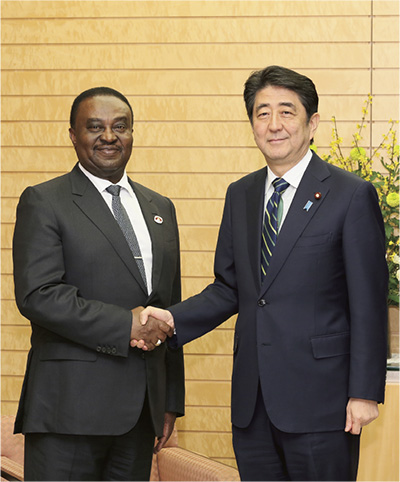 Prime Minister Abe shaking hands with National Assembly Speaker of the Republic of Angola, Fernando da Piedade Dias dos Santos(March 22, Tokyo, Photo: Cabinet Public Relations Office)
Prime Minister Abe shaking hands with National Assembly Speaker of the Republic of Angola, Fernando da Piedade Dias dos Santos(March 22, Tokyo, Photo: Cabinet Public Relations Office)B Zambia
With its stable domestic affairs since the independence, Zambia is said to be a stabilizing force in Southern Africa. Zambia proactively contributes to regional peace and stability including through peace mediation to neighboring countries and acceptance of refugees. The incumbent President Lungu was re-elected in August as a result of the presidential elections, which counts for the second term. Diversification of the industrial structure and promotion of foreign investment remain as the highest priority in its economic policy, and investment from Japanese companies is expected, based on the stable domestic situation and abundance of mineral resources.
C Zimbabwe
Zimbabwe has implemented various industrial development policies under President Mugabe, who is in his sixth term of office. The issues which the country has been tackling include trade, investment and fiscal administration.
President Mugabe visited Japan in March, held a summit meeting with Prime Minister Abe, and issued a joint statement. As a form of real economic cooperation between the two countries, Prime Minister Abe announced that Japan will continue to assist Zimbabwe's development efforts and the improvement of the investment environment following the previous year's grant aid, which was provided to Zimbabwe for the first time in 15 years.
D Republic of South Africa
The Republic of South Africa continues to attract attention from Japanese and other foreign companies, as a major economic power in Sub-Saharan Africa and as a base for operating business in the region.
In February, the Federation of Economic Organizations (Keidanren) dispatched the Southern Africa Economic Mission, and held meetings with dignitaries including Deputy President Ramaphosa. In addition, Prime Minister Abe held a summit meeting with President Zuma on the occasion of the TICAD VI in August, and announced cooperation in the fields of job creation and human resource development.
E Mozambique
Mozambique has been attracting considerable attention from Japanese and other foreign companies as an investment destination thanks to its abundance of energy resources such as oil and natural gas. Resource development by these foreign capital has led to steady economic growth.
The Japan-Mozambique summit meeting was held on the occasion of the TICAD VI in August and both leaders mutually confirmed further development of bilateral relations towards the 40th anniversary of the diplomatic relations between Japan and Mozambique in 2017.
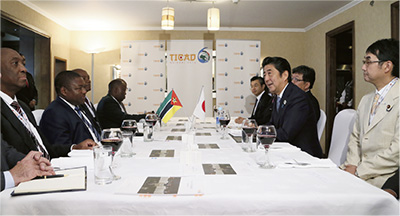 Prime Minister Abe meeting with Mozambique President Nyusi (August 26, Nairobi, Kenya, Photo: Cabinet Public Relations Office)
Prime Minister Abe meeting with Mozambique President Nyusi (August 26, Nairobi, Kenya, Photo: Cabinet Public Relations Office)F Lesotho
Lesotho, a land-locked country surrounded by the Republic of South Africa, celebrated the 50th anniversary of independence in 2016, and a memorial ceremony was held in Maseru on Independence Day (October 4th).
To mark this commemorative year, Their Majesties King Letsie III and Queen Masenate Mohato Seeiso visited Japan for the first time in November. During their stay in Japan their Majesties visited Tokyo and other regions. The visit by Their Majesties to the Tohoku region to inspect the disaster-affected area, in particular, was an opportunity to internationally disseminate the latest reconstruction status of the affected areas.
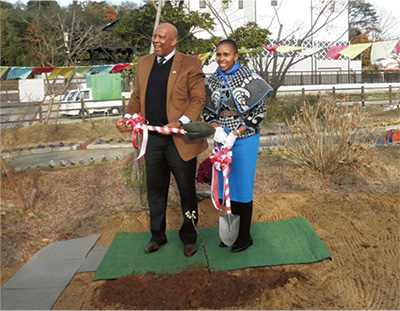 Tree planting ceremony to plant reconstruction memorial tree by their majesties King Letsie III and Queen Masenate Mohato Seeiso of Lesotho (November 26, Soma City, Fukushima Prefecture)
Tree planting ceremony to plant reconstruction memorial tree by their majesties King Letsie III and Queen Masenate Mohato Seeiso of Lesotho (November 26, Soma City, Fukushima Prefecture)(4) Central Africa
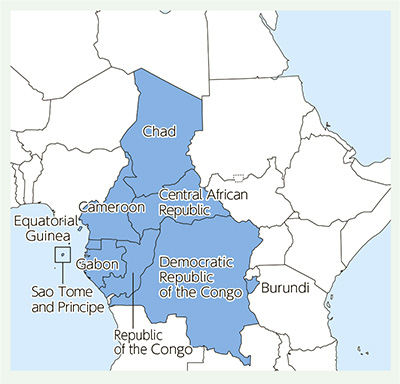
A Democratic Republic of the Congo
The Democratic Republic of the Congo, located in Central Africa, is faced with issues such as the activities of anti-government forces of neighboring countries in the eastern part of the country. Even now, the United Nations Organization Stabilization Mission in the Democratic Republic of the Congo (MONUSCO) is being deployed.
Though President Kabila's first term of office expired in December, President Kabila remained in the post without organizing the next presidential election. Discussion for a presidential election to be held before the end of 2017 continues based on an agreement concluded between the ruling and opposition parties executed on December 31. Since the stability and growth of the Democratic Republic of the Congo is likely to contribute to the development of the neighboring regions, Japan is implementing democratization training for police with UN organization as well as infrastructure development and environmental conservation activities, for the consolidation of peace.
B Sao Tome and Principe
Former Prime Minister Carvalho was elected as President of Sao Tome and Principe in the presidential elections held from July to August. Japan dispatched electoral observers to the elections.
In December, the country terminated diplomatic relations with Taiwan that had been in place for about 20 years, and restored diplomatic ties with China.
C Equatorial Guinea
President Nguema of Equatorial Guinea, who was elected for his fifth term in April, attended the TICAD VI in August and held a summit meeting with Prime Minister Abe. President Nguema expressed appreciation for Japan's support in areas such as human resource development and policy.
D Chad
Chad plays a major role in regional stability through measures such as dispatching many troops to UN PKO in neighboring countries and counter terrorism operations, as well as accepting many refugees from neighboring countries. The incumbent President Deby Itno was reelected (for a fifth term) at presidential elections held in April.
The President, who was the 2016 Chair of the African Union visited Japan in May to participate in the Outreach Meeting of the G7 Ise-Shima Summit. He had a Japan-Chad Summit Meeting and issued a joint statement with Prime Minister Abe. In August, President Deby Itno co-chaired TICAD VI with Prime Minister Abe and Kenyan President Kenyatta, and led the conference to success.
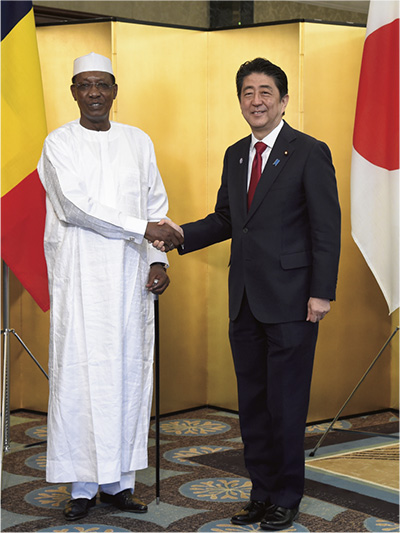 Prime Minister Abe shakes hands with President of Chad Idriss Deby Itno(May 28, Nagoya, Aichi Prefecture, Photo: Cabinet Public Relations Office)
Prime Minister Abe shakes hands with President of Chad Idriss Deby Itno(May 28, Nagoya, Aichi Prefecture, Photo: Cabinet Public Relations Office)(5) West Africa
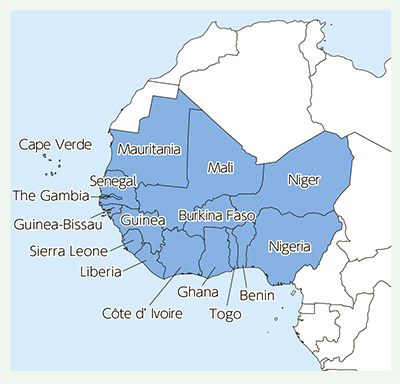
A Ghana
Ghana, which is recognized as a role model of democracy in Africa, held a presidential election in December 2016 and the former Foreign Minister and opposition party candidate Akufo-Addo was elected. House of Representatives Member Manabu Sakai (President of the Japan-Ghana Parliamentary Friendship League) attended the January 2017 presidential inauguration ceremony as a special envoy of the Prime Minister.
In terms of relations with Japan, President Mahama visited Japan in May and held a summit meeting with Prime Minister Abe, issuing a joint statement that included lines on economic cooperation. President Mahama and Prime Minister Abe also held a summit meeting on the occasion of the TICAD VI in August.
B The Gambia
The Gambia, which hosted the June Preparatory Ministerial Meeting of the TICAD VI, held a presidential election in December. The incumbent President Jammeh lost after being in power for more than 20 years and Adama Barrow was elected. President Jammeh rejected the results of the election, but later in January 2017, he left The Gambia accepting mediation led by countries in West Africa. Thus a transition of the administration was realized.
C Guinea
Guinea suffered from the outbreak of the Ebola Virus Disease from 2014 to 2015. At the end of December 2015, President Conde was re-elected (for a second term), and in January 2016 a cabinet was formed under the leadership of Prime Minister Youla.
President Conde attended the TICAD VI in August, and held a summit meeting with Prime Minister Abe. They agreed on matters such as the promotion of development cooperation for reconstruction and growth after the Ebola outbreak.
D Côte d'Ivoire
A new constitution that includes the establishment of the post of Vice-President and an upper house was promulgated in November following a referendum in Côte d'Ivoire, which has been enjoying a stable economic growth in recent years. However, there were concerns on the security front of increased terrorist attacks by Islamic extremists such as the beach resort attack in the outskirts of Abidjan in March.
Japan dispatched the Public and Private Sector Joint Mission for Promoting Trade and Investment in Africa, led by State Minister for Foreign Affairs Kihara, and joined by 13 private sector companies, to Cote d'Ivoire in March. President Ouattara had a summit meeting with Prime Minister Abe on the occasion of the TICAD VI in August, and the two leaders announced the commencement of negotiations for a bilateral investment treaty.
E Nigeria
In Nigeria, President Buhari has been undertaking mopping up operations and achieved a certain degree of success in relation to Boko Haram, an Islamic extremist group that has repeatedly conducted acts of terrorism mainly in the northeast of the country. However, being Africa's largest oil-producing country, the economic situation has deteriorated because of the drop in resource prices.
President Buhari held a summit with Prime Minister Abe on the occasion of the TICAD VI in August and exchanged opinions about the importance of developing Nigeria's investment environment.
F Senegal
Senegal is a stable country in West Africa, and is serving as a UN Security Council non-permanent member together with Japan for a two-year term starting from 2016.
Bilateral cooperation and cooperation in the international arena with Japan has been strengthened. Foreign Minister Kishida held a breakfast meeting with Minister for Foreign Affairs and Senegalese Abroad Ndiaye on the occasion of the open debate of the UN Security Council in July. In August, Foreign Minister Ndiaye visited Japan and held a meeting with Foreign Minister Kishida. In the same month, Prime Minister Abe had a summit meeting with President Sall on the occasion of the TICAD VI.
In December, Parliamentary Vice-Minister for Foreign Affairs Shunsuke Takei attended “The third Dakar International Forum on Peace and Security in Africa”, and called for a policy further contributing to peace and stability in the international community based on proactive contribution to peace.
G Benin
Benin, which is said to be a model for democracy in West Africa, held a peaceful presidential election in March, and President Talon was elected. Member of the House of Representatives Shinsuke Okuno attended the inauguration ceremony in April as special envoy of the Prime Minister. In August, Prime Minister Abe and President Talon had informal talks on the occasion of the TICAD VI.

